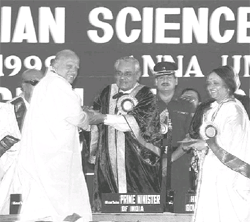Future science
 in the field of science, the next century would belong to biology, say scientists attending the 86th Indian Science Congress Association ( isca), held in Chennai, Tamil Nadu, from January 3-7. They discussed issues that could possibly play a crucial role in shaping India's next millennium. The theme of the congress was New Biosciences: opportunities and challenges as we move into the next millennium . The general president of the congress and secretary, department of biotechnology ( dbt ), Manju Sharma, said the congress agreed to provide a major thrust to human resource development activities in the field of biosciences, with active support from the dbt .
in the field of science, the next century would belong to biology, say scientists attending the 86th Indian Science Congress Association ( isca), held in Chennai, Tamil Nadu, from January 3-7. They discussed issues that could possibly play a crucial role in shaping India's next millennium. The theme of the congress was New Biosciences: opportunities and challenges as we move into the next millennium . The general president of the congress and secretary, department of biotechnology ( dbt ), Manju Sharma, said the congress agreed to provide a major thrust to human resource development activities in the field of biosciences, with active support from the dbt .
The debates in the conference focused on genetic engineering, genomics and other related issues and their importance to India's future. "Ever since deoxyribonucleic acid ( dna ) structure was discovered in 1953, biology has never been the same: it has been in a state of dynamic evolution,' said one expert. Advances in biology have, in turn, paved way for progress in agriculture, medicine and industry. Says eminent agricultural scientist M S Swaminathan: "With the help of science, we should examine how we can make technology a powerful ally and help eliminating poverty, hunger and illiteracy.'
However, India's efforts in this field are not limited to the fundamental issues. The country's human genome diversity programme aiming to map human genetic diversity is probably one of the first such initiatives in this direction, notes Sharma. Genome diversity projects look at genetic differences among groups of people. The Indian programme is still in its nascent stage, but may soon attract a lot of controversy. Nobel laureate and one of the discoverers of dna James Watson, also present in the conference, said in the us, most people are opposed to such human diversity projects and feel that it would only encourage racism. Many other scientists voiced similar concerns on this issue. Some feared that the gene-based technology arose out of the now-discredited notions of eugenics. Says Swaminathan: "We have to develop a precautionary package so that this technology is not misused.'
However, Watson was quick enough to note the flipside of the genetic research: "Understanding genomic diversity would enable medical treatments to suit individuals more precisely.' According to him, people afraid of dna technology are living in the past.
Inaugurating the congress on January 3, Prime Minister Atal Behari Vajpayee urged Indian scientists to deliver the goods in the case of any country denying the nation opportunities of legitimate scientific cooperation. The Prime minister also gave away the annual scientific awards, including the Jawaharlal Nehru birth centenary award to the Union minister for human resource development Murli Manohar Joshi, and the Shatabadi Puraskar awards to renowned scientists M S Swaminathan and V Ramalingaswamy.
An important subject that came up for discussion was that of scientific education. Most of the experts felt there remains a tremendous lack of scientific education in India. They argued that India's education system should be changed in a way to incorporate science in more practical ways in the lives of the masses. Bruce Alberts, president of the us National Academy of Sciences, says: "Science should not be seen as a restricted profession practised only by the elite. People should be comfortable with it as science has direct and growing impacts on their jobs and lives. Swaminathan agrees: "Science education will equip people with a basic set of thinking skills.
People should be able to distinguish between good and bad science.'
The congress also touched upon some controversial subjects, including the issue of patents. Some scientists felt that India should consider the patenting of genes to protect its intellectual property rights related to genes and genetic products. "We would like to permit the patenting of genes,' said Sharma. Sir Richard Sykes, president of the British Association for Advancement of Science stressed on the need for a strong intellectual property rights regime to exploit the advances being made in the discovery of new drugs.
Related Content
- Report on behalf of Pune Municipal Corporation (PMC) on the use of enzyme Draynzyme to clean waterbodies, 04/04/2024
- First food: future of taste
- The changing nature of human-forced hydroclimatic risks across Africa
- Joint committee report on measures to curb air pollution, traffic congestion and encroachments in and around AIIMS, Delhi, 01/07/2023
- Nature's frontiers: achieving sustainability, efficiency, and prosperity with natural capital
- India's climate research agenda: 2030 and beyond
